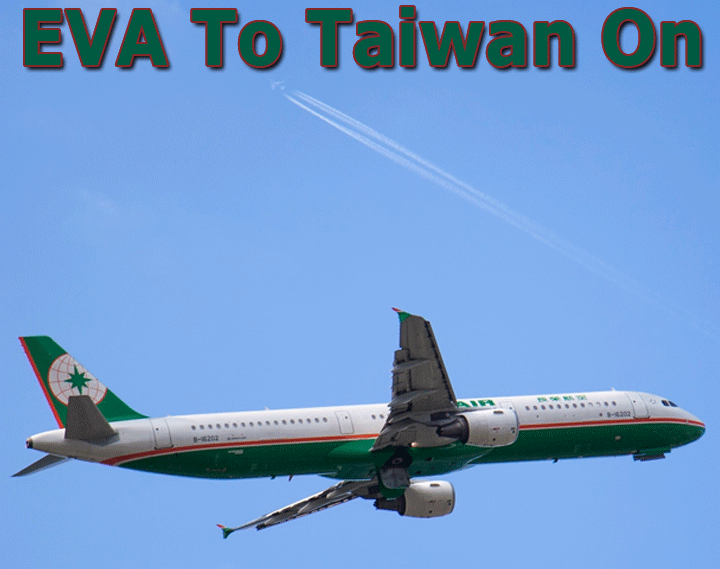| 
Two In View . . . EVA Air takes off from the
Songshan Airport as contrails reveal another commercial airplane above
Taipei, Taiwan, on Sunday July 26.
It
may come as little surprise that just like many of Asia’s leading
airlines, cargo revenues account for a major percentage of EVA Air’s
income—on average about 30 percent of total operating revenue.
Therefore, when talking routes and the future
at EVA, much of the carrier’s focus is on the transpacific trade.
“For EVA Cargo, Asia-North America
is more prominent than Asia-Europe due to the facts of geographic site,
trade patterns, as well as higher operating profit,” said a spokesperson.
“In addition to operating 18 weekly
freighter services into North America, we keep exploring all the possibilities
to increase passenger frequencies—Seattle flights were increased
to daily, Toronto and Vancouver are planned to be increased to 5 week,
etc. Overall, North America flights will be increased from 55 weekly flights
to 63 at the end of 2015.”
The Taiwan-based carrier, part of the Evergreen
Group that also includes one of the world’s leading container shipping
lines, operates a total of 71 aircraft including fifty-four passenger
jets, eight 747-400 freighters, and six MD-11 freighters.
New
Aircraft
 The news earlier in July that EVA reaffirmed
its commitment to its cargo operations by signing purchase agreements
for a further five Boeing 777 freighters—the first of which is due
for delivery October 2017 with the rest due to enter service by September
2019—speaks for itself.
The news earlier in July that EVA reaffirmed
its commitment to its cargo operations by signing purchase agreements
for a further five Boeing 777 freighters—the first of which is due
for delivery October 2017 with the rest due to enter service by September
2019—speaks for itself.
The new freighters will see the gradual
phase out of some of the airline’s B747-400Fs.
“We are determined to make EVA the
world’s best airline for both passenger and cargo services,”
said EVA Air Chairman K.W. Chang, noting that cargo remains an important
link in global trade and investing in the latest aircraft was central
to the airline’s strategic vision.
The
Vision Thing
“Certainly, EVA has a clear strategy
for its cargo operations,” a source told FlyingTypers.
“Taking advantage of lower fuel prices,
EVA adjusts routes and long-term plans to produce maximum profit, and
makes full use of its ample passenger bellyhold capacity to accommodate
customer demands,” the source added.
Last year the airline carried 680,000 tons
of cargo, achieving a load factor of 85 percent.
“The total cargo revenue was USD $1
billion, which declined by 2.4 percent year-on-year,” EVA the aircraft
order release noted.
“Actual flown ton kilometers was 4,777,094,129.”
Everyone knows at this point volumes in
late 2014 and during much of 2013 received a substantial boost due to
the U.S. West Coast port labor dispute, which saw major shortages of equipment
and congestion at sea and inland build up, prompting many shippers to
rely more heavily on air freight solutions.
“In the first months of 2015, due
to U.S. West Coast congestion and the urgent demand for auto parts, the
strongest lanes were from Asia to USA,” EVA declared.
“The dispute has now been solved and
the market volume and yield have returned to normal.”
EVA noted that core export business from
Taiwan was focused on various cargoes including electrical goods, garments,
fabrics, food stuffs, fashion items, medical supplies, car parts, and
accessories. Telecommunications equipment and miscellaneous manufactured
articles are also a mainstay for EVA.
What’s
Up Ahead?
As Summer 2015 continues EVA predicts higher
demand in the future for panels, auto parts, set-top boxes and solar energy
equipment as on-line purchasing and trading boosted express parcel and
airmail traffic demand.
EVA declares the cool chain is also a focus
for the carrier. EVA Cargo launched a new pharma service in April in collaboration
with Envirotainer. EVA Pharmacare uses the latter’s active temperature-controlled
containers for air cargo on a rent-it-when-you-need-it-basis, focused
on high value goods such as biologicals, pharmaceuticals, vaccines, healthcare
products, high-end food stuffs, and high-tech semi-conductor components.
The first wave of the service was aimed
at the Europe and Asia markets including Amsterdam (SPL), Paris (CDG),
Vienna (VIE), Taipei (TPE), Bangkok (BKK) and Singapore (SIN) and the
service was extended to London (LHR) and North America at the start of
June.
However, despite the carrier’s recent
investments and product launches, freight operators faced multiple challenges.
“We observe that the global cargo
market landscape has evolved over the last five years due to a number
of factors,” EVA told FlyingTypers.
“More goods are transported intermodally.
Bellyhold capacities have grown.
“Electronic products have become smaller
and thinner as demand for the kind of capacity provided by full-cargo
freighters has fallen.
“We continue to accommodate these
trends by adjusting our freighter fleet and long-term plans,” EVA
said.
SkyKing
|





